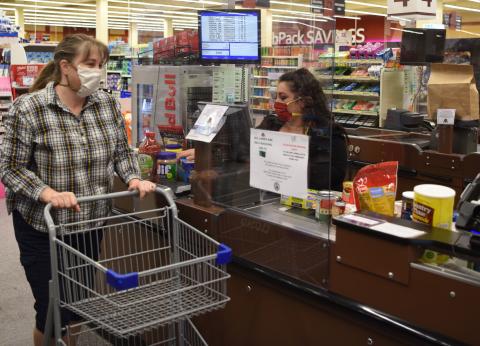Military commissaries in Europe are still receiving shipments of U.S. products; no shortages anticipated

FORT LEE, Va. – Military commissaries in Europe are still receiving shipments of U.S. products as U.S. Department of Agriculture officials negotiate with the European Union to work out an agreement on health certificate requirements.
In late February, the EU notified U.S. officials that Department of Defense cargo of certain dry food products containing animal components shipped via ocean carriers in Europe would require export health certificates. The shipments are solely for U.S. service members and their families stationed in Europe. This requirement potentially impacts European stores with the Defense Commissary Agency, the Navy Exchange, and the Army and Air Force Exchange Service as well as food service operations under the Defense Logistics Agency.
The EU requirements don’t affect U.S. shipments of frozen and chill items carried at the Defense Commissary Agency’s Kaiserslautern Cold Storage Center and the fresh beef and pork products at its Central Meat Processing Plant because these items already have health certificates, said DeCA Director and CEO Bill Moore.
“Currently there are no potential shortages as DeCA’s containers are flowing normally, and we do not anticipate any missed shipments,” Moore said. “We are coordinating closely with the Foreign Agricultural Service (FAS) of the U.S. Department of Agriculture (USDA) on all current and future EU requirements.”
During the past week, FAS negotiators have held multiple meetings with the Netherlands Food and Consumer Product Safety Authority, and the Dutch have agreed to allow 451 currently inbound containers destined for Rotterdam “to flow as they normally have in the past,” said Chris Burns, executive director for DeCA’s Sales, Marketing and Logistics Group.
All of DeCA’s dry food containers for its commissaries in Europe are shipped into Rotterdam and all its chill/frozen shipments are shipped into Antwerp, Belgium.
“The agreement to allow the 451 containers through would take us into the mid-April timeframe,” Burns said. “Going forward, we are hopeful that all required health certificates are secured for any container that follows the 451 in route. These would be certificates for the ‘shelf stable’ items as certificates are already provided for the chill and freeze items that are shipped to Europe.”
Currently, no shipments have been affected as product has flowed normally from the U.S. to DeCA’s central distribution centers (CDCs) in Germany. As a matter of normal operations, the agency’s central distribution centers in Europe maintain a 30-45 day stock assortment of dry goods to support DeCA’s stores there.
“It is important to stress that at this time there has been no effect on product being sent from the U.S. to Europe,” Moore said. “We will continue monitoring shipments to Europe and work with our military resale partners and industry suppliers to ensure our customers in Europe are supported.”
-DeCA-
Photo caption: A cashier rings up a customer’s purchases at the Ramstein Air Base Commissary in Germany. (DeCA photo)
About DeCA: The Defense Commissary Agency operates a worldwide chain of commissaries providing groceries to military personnel, retirees and their families in a safe and secure shopping environment. Commissaries provide a military benefit, saving authorized patrons thousands of dollars annually on their purchases compared to similar products at commercial retailers. The discounted prices include a 5-percent surcharge, which covers the costs of building new commissaries and modernizing existing ones. A core military family support element, and a valued part of military pay and benefits, commissaries contribute to family readiness, enhance the quality of life for America’s military and their families, and help recruit and retain the best and brightest men and women to serve their country.
